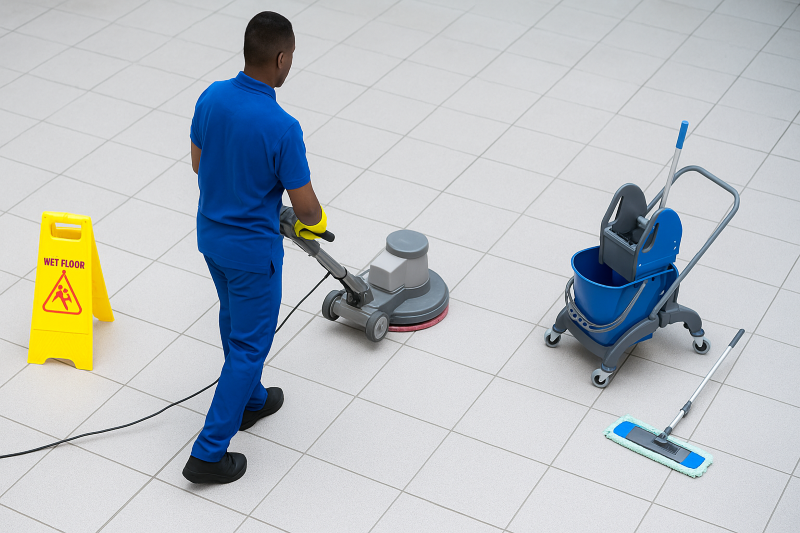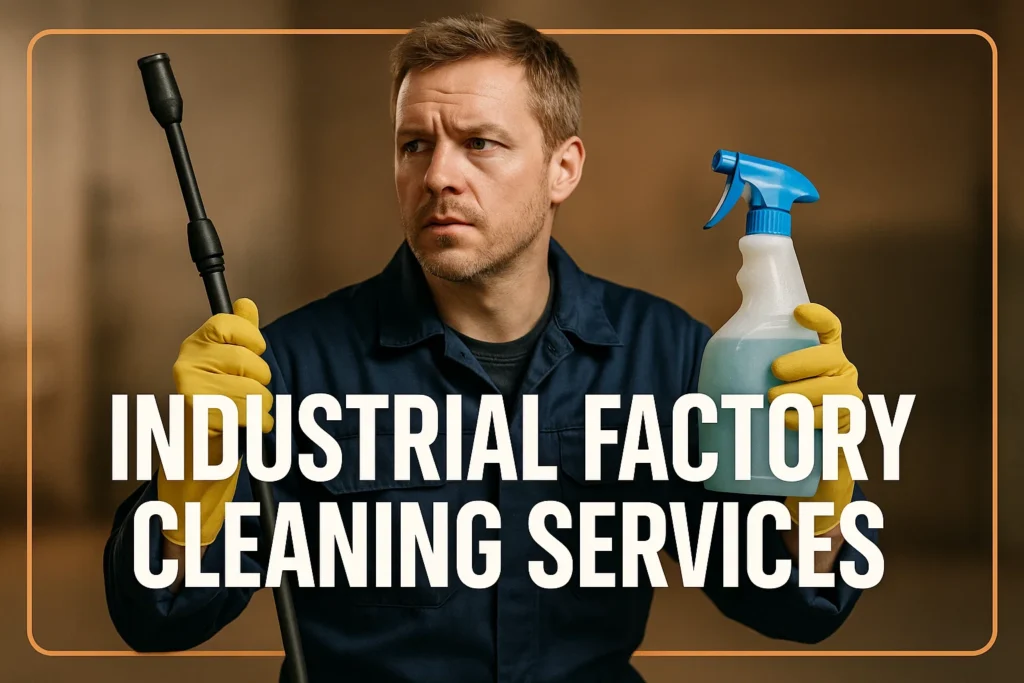The economic and manufacturing industries thrive on the back of industrial factories that produce all of our favorite and essential products. However, on the other hand, there is an insider need, more importantly and less noticeable, for expert cleaning services that keep the world hygienic and follow the rules. Without effective cleaning of the factory, toxic dust, deposits of chemicals and pollutants accumulate easily and endanger the health of workers, harm their expensive equipment, and can lead to expensive closure. The current competitive market situation is not only about cleanliness in terms of industrial factory cleaning, but rather about a strategic approach to business and provision of protection to your employees, maximizing their productivity, and complying with certain, rather rigid standards designated to the sphere of your business.
Importance of Industrial Factory Cleaning Services
The cleaning Service of industrial factories is much more than domestic cleaning; it is a significant measure of health, safety and efficiency. Factories have other claims to deal with, chemical spills and particles in the air are on one hand, or grease and shavings finding their own way to/in the factory are on the other. In the absence of professional cleaning services, the chances of such risks increase, which results in accidents, fines from the government services, and expensive repairs.
Preventing Equipment Malfunction and Production Downtime
A build-up of dirt and grime can lead to blockage of sensitive parts of the machine, leading to stenosis, excess wear, and unforeseen machine breakdowns. Consistently cleaning machines will eliminate dirt and ensure that the machines operate well, lessen machine expenses, and prolong the life of the equipment. The proactive measure has avoided costly production delays and enabled the business to run smoothly.
Key Hygiene Standards and Compliance for Factories
Compliances in industrial surroundings are not subject to negotiation. Such government agencies as OSHA and EPA can impose strict hygiene measures that reduce workplace hazards and their impact on the environment.
Overview of Regulatory Requirements
The cleaning schedules, disaster material handling, and waste disposal standards should be observed in the factories by means of documents. OSHA establishes safe cleaning procedures to accord protection to employees against chemical exposures and physical injuries, but EPA regulations designate environmental security.
Common Industry Hygiene Guidelines
These standards, including occupational health and safety frameworks like cleaning, are set by standards like ISO 45001. To achieve compliance, there must be regular training of staff, regular audits, and extensive hygiene management plans.
Essential Cleaning Processes in Industrial Factories

Industrial cleaning is a job that involves special methods and products that are supposed to be used in a factory. It involves regular cleaning and profound cleaning to control both routine and serious contamination or dangerous waste.
Routine Cleaning Tasks
The importance of cleaning the workplace every single day is essential to ensure it is a safe and well-organized environment. These activities include getting floors swept, sweeping up garbage and wiping floors and oftentimes checking those places most likely to be infected. These details will consistently be considered to avoid dirt accumulation and minimize health and safety hazards.
Daily Commercial Cleaning
Another aspect to include in day-to-day cleaning is to keep high-traffic and critical areas of an organisation hygienic and safe. This usually includes:
- Cleaning up floors and mopping them to avoid accidents and dust formation.
- Washing the walkways, toilet rooms as well as the break areas to encourage the well-being of the employees.
- Cleaning working areas and touching objects to reduce infection.
- Eliminating spills and debris as part of keeping the environment safe.
Daily cleaning helps reduce workplace hazards and keeps commonly used areas fresh and safe but is generally not enough for deeper contamination control.
Weekly Commercial Cleaning
More rigorous cleaning is done weekly, aimed at ensuring that equipment performance is not compromised due to dirt buildup. Common weekly tasks include:
- Cleaning storage facilities and shelves to prevent dusting.
- Washing the machine’s exterior to ensure that they are not dirty.
- Cleaning loading docks, air vents and loading bays to keep them safe and of quality air.
Routines that occur weekly need to prevent the occurrence of health and safety standards in the long term and aid the continuity of health and safety standards.
Monthly Commercial Cleaning
Monthly cleaning is deeper and more comprehensive, targeting areas that require less frequent but intensive attention. This includes:
- Cleaning of machineries and production lines to prevent failure.
- Flooring and industrial surfaces should be degreased as much as possible.
- Ceilings, beams, rafters, and ventilation ducts: Cleaning high-level structures.
- Checking as well as cleaning drainage systems to avoid clogging.
Such a cleaning level can prolong the equipment’s life, enhance air quality, and meet hygiene standard requirements imposed by the authorities.
Deep Cleaning and Sanitation Procedures
Besides the daily cleaning, once a week, deep cleaning is required to clean the factory areas thoroughly. This process involves a degreasing machine, scrubbing the areas with poor accessibility, disinfecting the surface, and harmless handling of chemical spills. Obviously, deep cleaning requires technological equipment and staff members who have specialized training in the field of industrial safety and hazards to make the processes as clean and safe as possible.
Environmental Benefits of Eco-Friendly Cleaning Products
Cleaning agents that avoid pollution and environmental damage as much as possible. The cleaning products are produced by using natural biodegradable materials that do not cause much pollution or damage to the environment. They are not tough in nature, they decompose easily, hence cause less water and soil pollution and they are packaged in easy-to-recycle or simple packaging. The consumption of such products reduces the total carbon footprint of a cleaning operation and creates a mature use of resources.
Health and Safety Advantages for Workers
Less serious chemicals and toxins are present in green cleaning products, which reduce the risk of pulmonary problems, skin problems, and other side effects among employees. A healthier and safer workplace environment of better indoor air quality and less exposure to chemicals makes the employees comfortable and thus more productive.
Cleaning Performance of Green Industrial Products
Even though they are eco-friendly, there are a lot of eco-friendly industrial cleaners that offer good cleaning performance. They are satisfactory removers of grease, dirt and other contaminants without destroying delicate machines or surfaces. Concentrated formulas also imply that less product is required for use, thus holding down efficiency.
Cost and Sustainability Benefits
The reason is that, though eco-friendly products may require more upfront purchasing expenses, some of them are more focused in nature and their packaging is less bulky, which may save money in the long term. They produce less waste material and use less water and energy, which is in line with the objectives of sustainability and operate the business at a low cost.
Regulatory Compliance and Corporate Responsibility
Cleaning with friendly industrial products assists businesses in adhering to conscientious environmental standards and prevents overhaul sanctions in terms of the usage of hazardous chemicals and disposal of waste. This also improves the image of the company since it shows concern about corporate social responsibility and green practices.
Types of Industrial-Grade Cleaning Products
Some products used in the cleaning of industries include solvents, disinfectants, cleaning floors, and degreasers. Green substitutes of these products tend to comprise plant materials or less harmful chemical substances that are capable of fulfilling the industrial demands of the brands, but at the same time, they are very environmentally friendly.
How to Choose Eco-Friendly Cleaning Solutions for Factories
Select products certified by reputable organizations (e.g., EPA Safer Choice, Green Seal) that ensure environmental and safety standards. Consider product effectiveness, ingredient transparency, and compatibility with your factory’s cleaning requirements to maintain both hygiene and sustainability.
Benefits of Professional Factory Cleaning Services
Hiring an external company to clean the industry has many benefits compared to employing it within the company, which results in improvements in ethical standards and healthier working conditions.
Expertise and Specialized Equipment
Professional cleaning forces arrive with a tremendous amount of industrial cleaning experience and equip themselves with professional equipment, including industrial vacuum cleaners, high-pressure washers and chemical neutralizers. They are competent in cleaning without causing much risk to the workers and equipment.
Cost Efficiency and Long-Term Savings
Despite the need to enter into financial investments when attempting to employ professional cleaning services, the latter can lead to large-scale savings in the long run. Outsourcing would decrease the costs of labor, cut the costs of repairing equipment, as there will be no damage, and prevent the payment of expensive fines connected with the neglect of the rules.
How to Choose the Right Industrial Cleaning Service Provider
When choosing a reliable sanitizing business enterprise, it is of great importance to take care of the hygiene, safety and regulation levels at your factory. Such complex conditions of industries require not all cleaning providers to be able to address their needs and, that is why special attention should be paid to their selection.
Evaluating Experience and Certifications
It is also important to make sure that the cleaning firm selected has been in the business of doing the exact job you wish them to perform. Ensure that they possess pertinent qualifications, including OSHA training or ISO 45001 compliance qualifications, and that they take safety and best practices seriously. Ask for cases or references of how they have been successful with other industrial clients.
Checking Compliance with Safety Standards
A cleaning service provider must be only in an effort that he/she concisely follow OSHA regulations and environmental safety standards set by the Federal Government. They should train their workers on how to handle toxic materials safely and hire certified cleaning agents who do not harm both workers and machines. Furthermore, the operations provider is to possess the relevant guidelines about proper disposal of waste materials and prevention of contamination to ensure that the rules are consistently followed and the workplace remains safe.
Conclusion
Ensuring hygiene and compliance by hiring professional industrial factory cleaners is essential to save your labour force, to keep expensive equipment in good shape, and to adhere to rigid regulations. Having your professionals clean up is a brilliant business move that will ensure that your business does not encounter any stop-and-go problem at a hefty price. Good to go to a safer, cleaner and more efficient factory? Contact us today for Deep Cleaning Service, a free consultation and a customized industrial cleaning plan that meets all hygiene and compliance requirements.
FAQ’s
Cleaning happens daily or weekly, and deep cleaning happens monthly or quarterly, depending on the type of production.
Yes, there are a lot of industrial eco-friendly products, which provide a good cleaning performance and are less harmful to the environment.
OSHA training certification, ISO 45001 compliance and hazardous material handling expertise should be possessed by the providers.
Absolutely. It will reduce risks such as slipping, exposure to chemicals and contamination, thus creating a safe place of work.











